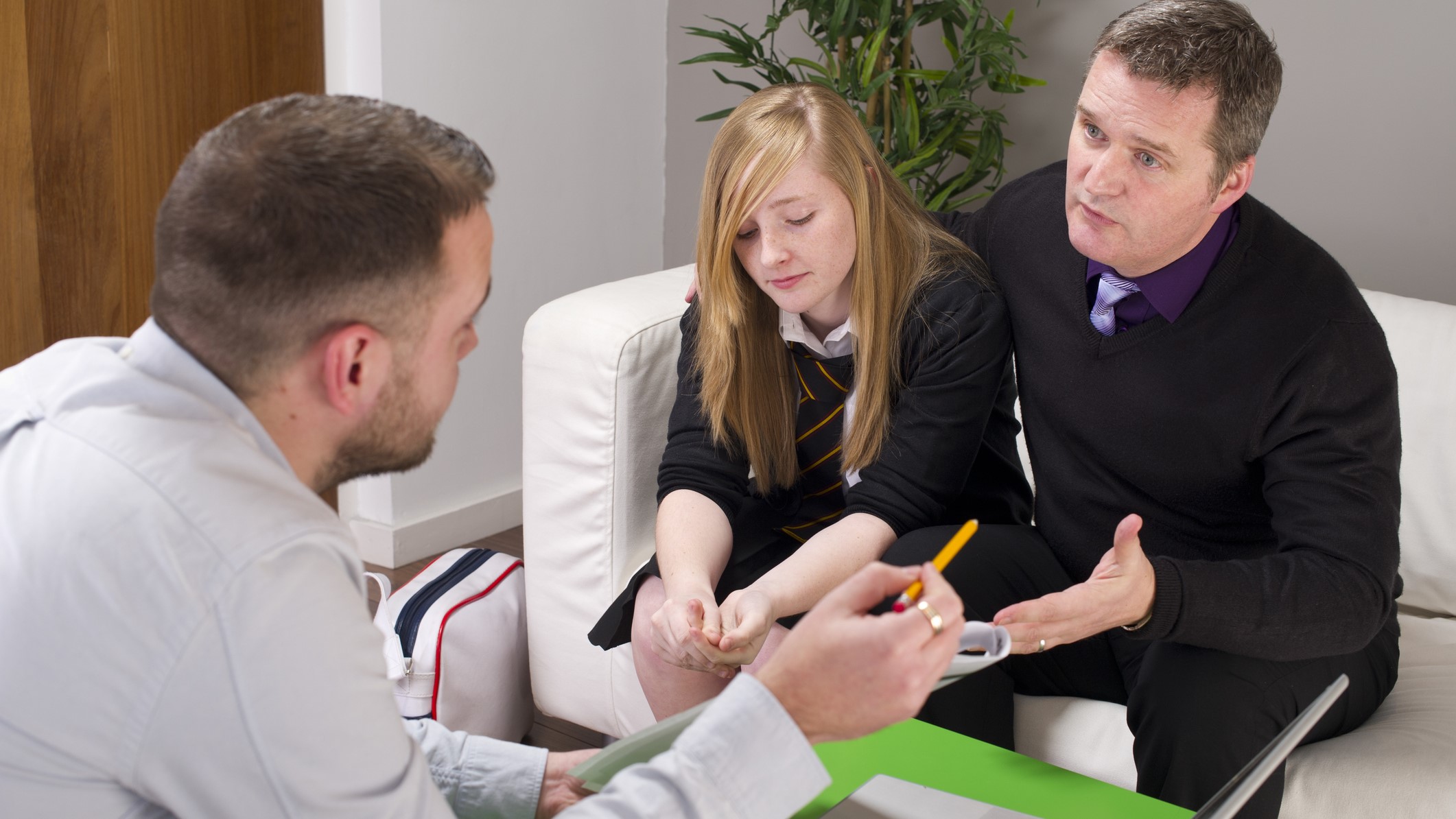
How you approach your child’s school can make a big difference in how staff deal with bullying - we’ve got advice and information on how to talk to teachers, knowing your rights and understanding the legal situation.
If your child is struggling to make friends or showing poor mental health, such as anxiety or depression, you may be worried that thye’re showing signs of being bullied. Dealing with teachers and school staff in stuations like this can be a hugely stressful time for parents. All you want to do is protect your child; yet it may feel as if the school isn’t taking your worries seriously enough. We’ve spoken to a number of educational experts to get advice and tips on how to remain calm, get your point across, and hopefully the best outcome for your child.
There are lots of things you can do to make the school take allegations of bullying seriously, but it's also good to know what to do if they're not doing the job of protecting pupils.
“The law around bullying is complex,” says solicitor Samatha Hale. But as a starting point all Local Authority maintained schools and academy schools must have anti-bullying policies and procedures in place, and they need to ensure they are appropriately followed.” We’ve got your back if your child is being bullied. Our expert advice and tips will help you approach the school and get the help and support your child needs.
What you need to know about bullying in schools
Recent research by the Department for Education reveals a concerning picture of bullying in UK schools. Among year 10 pupils, 40% reported being bullied in the past year (2023), with 6% experiencing daily bullying. Name-calling, including via digital means, was the most common form of bullying, followed by social exclusion.
The impact on education is significant: bullied children are three times more likely to truant, with girls being particularly affected. Parents of frequently bullied children are more likely to keep them home, and these students face a higher risk of school exclusion.

Children with special educational needs are especially vulnerable, with one in four experiencing violence or threats. Most physical bullying occurs on school premises, highlighting the need for improved school-based interventions and support systems.
It’s clear from the stats above that bullying has never really gone away in our schools, but instead is increasingly moving online, into teenagers’ smartphones and into their homes. But what can parents and schools do about bullying, whether digital or face-to-face? The answer is a lot, as long as they work together to tackle the issue.
The first step for many parents is getting their child to admit they’re being bullied. “The biggest challenge with bullying and kids is that they suffer silently; less than half of kids being bullied ever tell an adult,” says psychologist Dr Lisa Strohman. “So it’s hugely important to encourage your child to share their experiences without fear of judgment or dismissal.”
How to work with the school when your child is bullied
Our experts share their advice and tips on doing this in a calm, but effective way:
- Gather evidence and document incidents of bullying
- Contact the school via email to report the bullying and request a meeting
- Request a copy of the school’s anti-bullying policy
- Prepare for the meeting with the school
- Agree an action plan with the school and a deadline for reviewing the action plan
- Keep your child informed and be a positive role model
1. Gather evidence and document incidents of bullying
When your child is being bullied, it's crucial to gather as much evidence as possible. “Keep a detailed record of the bullying incidents, including dates, times, locations, and the nature of the bullying,” says Dr Lisa. Education expert Carey Ann Dodah suggests noting the names of individuals involved, too, as this information may be helpful if the issue escalates and you need eyewitnesses.
It doesn't matter if the school bully approached your child outside the school or via social media; the school still has a responsibility to protect their pupils from bullying.

If the bullying is happening online, try to get as many screenshots of the abuse as you can, including any memes, videos or messages. Sara-Jane’s Year 9 daughter is being physically bullied at school and cyberbullied at home by three other girls in her year. She told us, “I have chains and chains of emails from the school as well as folders full of screenshots of horrible messages. It’s been exhausting and feels like my full-time job, but I’m not going to give up.”
2. Contact the school via email to report the bullying and request a meeting
The first formal step in addressing bullying is to inform the school. Solicitor Samantha Hale advises contacting the school via email to ensure there is a written record of your concerns. In your email, briefly outline the incidents and request a meeting with relevant staff members, such as your child’s teacher, form tutor, head of year, school counsellor, or headteacher. This written communication not only provides a clear account of your concerns but also allows you to track the school’s response and actions.
3. Request a copy of the school’s anti-bullying policy
“At the same time you report the bullying to your child’s school, request a copy of the school’s anti-bullying policy, so you can check it and make sure the school adheres to it,” suggests Samantha. The NSPCC also suggests requesting a copy of the school’s compliant procedure and behaviour policy.
Familiarise yourself with school policy so you can reference it during your meetings. This step will also help you understand what actions the school is obligated to take and how they plan to protect your child.
4. Prepare for the meeting with the school
Before meeting with school staff, it’s essential to be well-prepared. Carey Ann suggests being ready to discuss the specifics of each incident and any patterns you have noticed. Be especially careful to note the effect the bullying has had on your child.
Bring a notepad or make notes on your phone so you can remember what’s said by school staff. It’s also worth considering what outcomes you want to achieve and being ready to discuss potential interventions or support strategies.
5. Agree an action plan with the school and a deadline for reviewing strategies
During your meeting, work with the school to develop a clear and actionable plan to address the bullying. Samantha recommends setting specific steps the school will take, such as increased supervision or targeted interventions, but do be prepared for the school to ask that they investigate the allegations themselves too.
“If the school is not aware of the bullying, they might want an opportunity to investigate before determining what steps they will take,” says Samantha. “If this happens, set a date with the school for when they will have completed their investigation and informed you of the steps they will take. You could ask them to formalise the steps they will take in a ‘plan of action’ and make sure that it is widely shared with school staff and yourself.”

Samantha also suggests asking to set a date for a formal review of the plan of action. This will allow you and the school to assess whether the bullying has decreased and make any necessary adjustments to the strategies you’ve all agreed to.
Carey Ann also suggests asking for the school to identify a key person of trust that your child can go to in case there are any incidents at school. Not only does it give your child a ‘safe place’ to go to, but it will “reassure you that your child has a support network in school, which will allow you to feel more relaxed during school hours,” says Carey Ann.
6. Keep your child informed and be a positive role model
Throughout the whole process, Dr Lisa says it’s crucial to keep communication open and transparent with your child and reassure them that the situation is being addressed and that they have your full support.
Dr Lisa highlights the importance of reinforcing your child’s self-worth and resilience through positive affirmations and activities that build self-esteem. Acknowledge their efforts and achievements, however small, to build a sense of accomplishment that is authentic and true to their experience. By modelling calm and constructive behaviour, you help your child learn how to handle difficult situations with maturity and confidence. Regularly check in with them to monitor their well-being and to ensure they feel safe and supported both at home and at school.”

Carey Ann agrees and says it can be worth contacting a professional therapist or counsellor if you feel your child is continuing to suffer from being a victim of bullying. “Seek support from a child psychologist or counsellor if you think it may help your child to continue talking about the issue and how it made them feel in an external setting.” The school may also be able to help with setting this up.
What happens if the bullying continues?
If bullying persists, request another meeting with the school and follow their complaint policy if necessary. Continue to document incidents thoroughly, including photographs of injuries, details of each event, and communication with the school.
As Samantha points out, it’s always best to try to resolve the situation by working directly with your child’s school. “But if you feel like you are getting nowhere, or if the bullying is severe and you need immediate action which is not forthcoming, you could escalate matters and make a formal complaint to either the Head Teacher or Board of Governors. You could also complain to the Local Authority about Local Authority run schools or the Academy Trust if the school is an academy school.” Following the school's complaint process is crucial at every step to ensure your concerns are properly documented and addressed.
Family Lives also suggests asking for a copy of your child’s school record to find out how they are getting on during school hours. The record should also have any copies of complaints you’ve made with any actions taken. You can also contact your local MP and ask them for assistance and support if the bullying is not resolved.
“Bullying itself is not a specific criminal offence,” says Samantha. “However, bullying can sometimes be so severe that it can actually constitute a criminal offence if there is a threat of violence or actual violence; assault; theft; criminal damage or repeated harassment or intimidation, for example, abusive text messages, emails, social media posts (cyberbullying), phone calls or direct name calling, or hate crimes. Bullying of this nature should be reported to the school and the police without delay.”
Featured experts
Get more advice and information on tackling difficult subjects with your kids, from when and how to talk to your child about sex to how to talk to your kids about porn. Plus, worried your teen has stopped talking to you? Experts share five reasons why this is 'to be expected' and what you can do to help them.







